


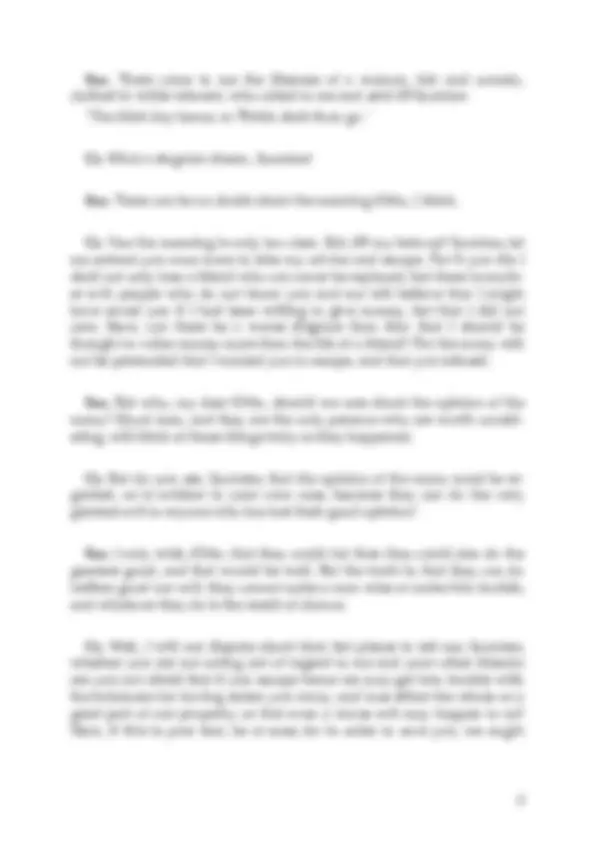


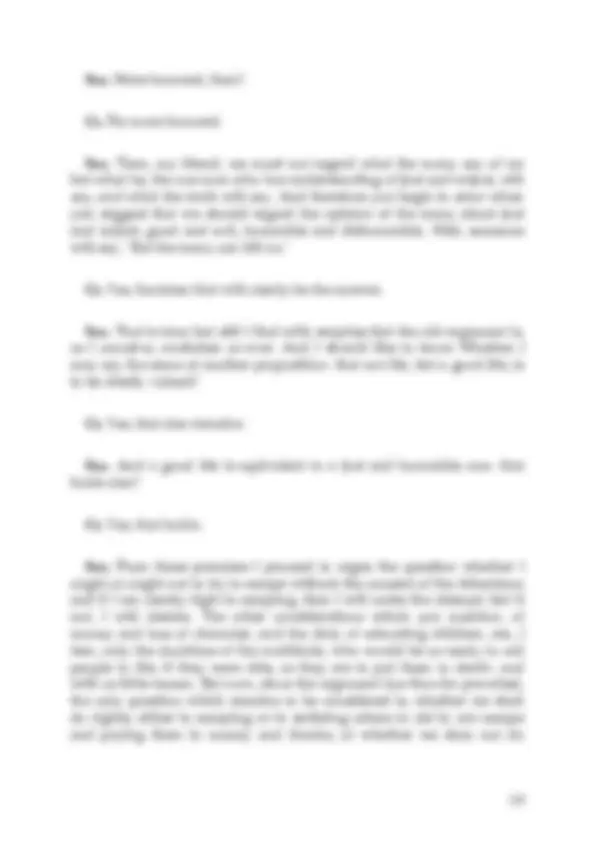
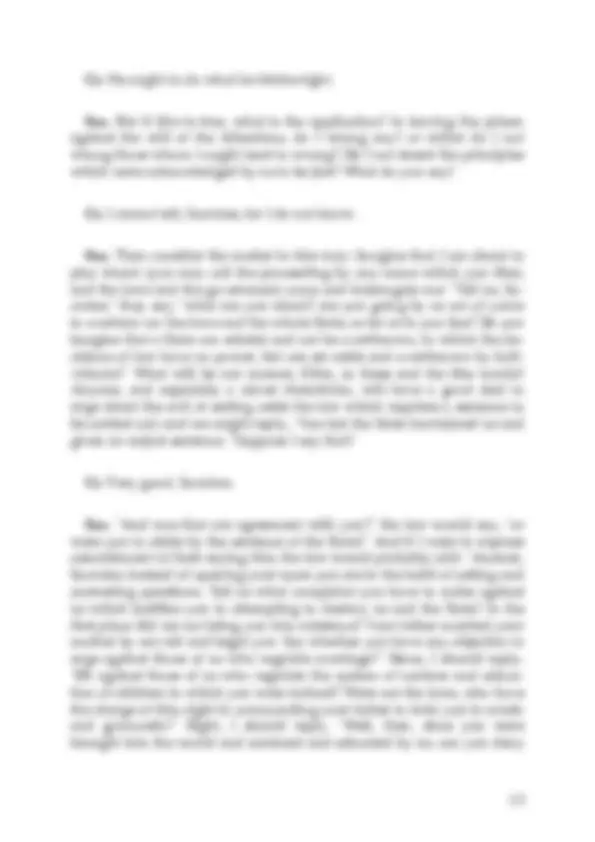
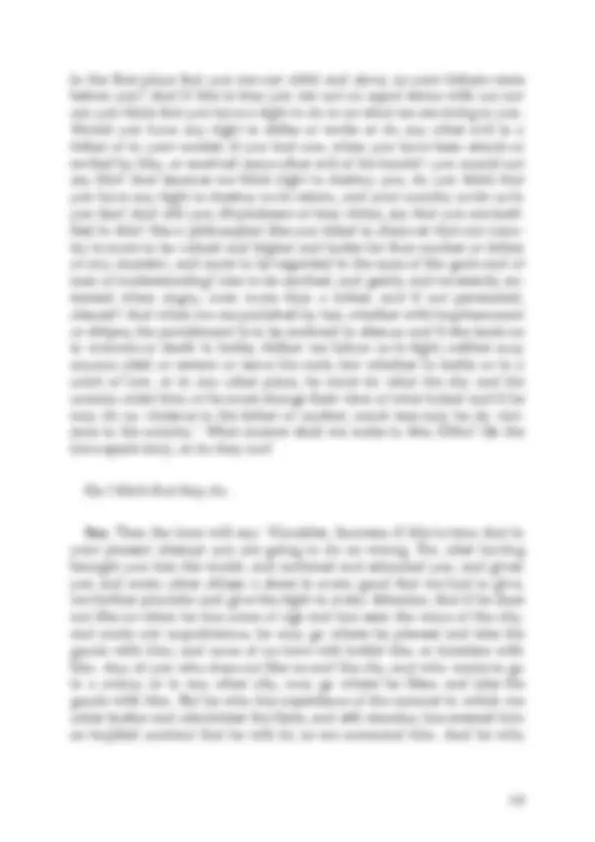
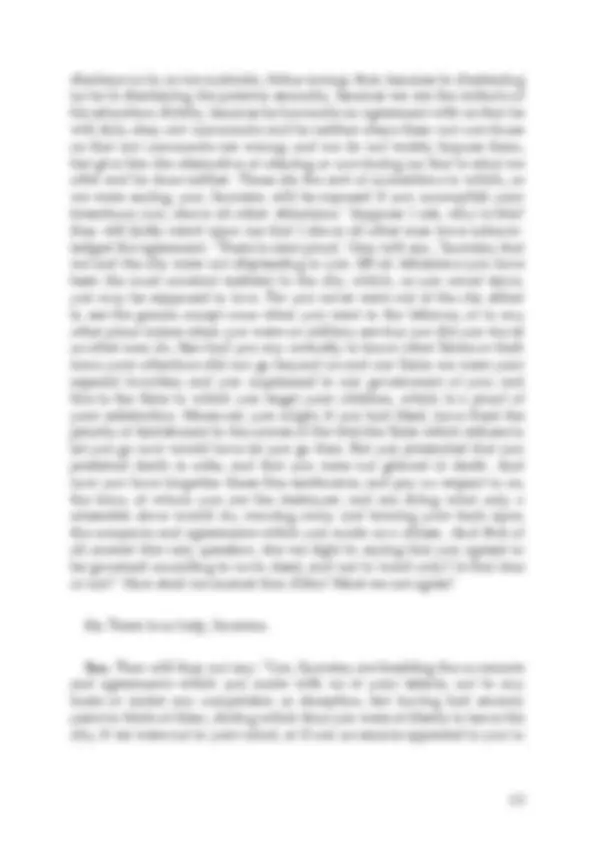




Study with the several resources on Docsity

Earn points by helping other students or get them with a premium plan


Prepare for your exams
Study with the several resources on Docsity

Earn points to download
Earn points by helping other students or get them with a premium plan
Community
Ask the community for help and clear up your study doubts
Discover the best universities in your country according to Docsity users
Free resources
Download our free guides on studying techniques, anxiety management strategies, and thesis advice from Docsity tutors
Crito is a dialogue that was written by the ancient Greek philosopher Plato. It depicts a conversation between Socrates and his wealthy friend Crito of Alopece regarding justice, injustice, and the appropriate response to injustice after Socrates' imprisonment, which is chronicled in the Apology.
Typology: Lecture notes
Uploaded on 01/26/2021
4.8
(8)13 documents
1 / 19

This page cannot be seen from the preview
Don't miss anything!












Plato (Translator: Benjamin Jowett)
Published: - Type(s): Philosophy Source: http://en.wikisource.org
About Plato:
Plato (Greek: Plátōn, "wide, broad-shouldered") (428/427 BC – 348/ 347 BC) was an ancient Greek philosopher, the second of the great trio of ancient Greeks –Socrates, Plato, originally named Aristocles, and Aris- totle– who between them laid the philosophical foundations of Western culture. Plato was also a mathematician, writer of philosophical dia- logues, and founder of the Academy in Athens, the first institution of higher learning in the western world. Plato is widely believed to have been a student of Socrates and to have been deeply influenced by his teacher's unjust death.
Plato's brilliance as a writer and thinker can be witnessed by reading his Socratic dialogues. Some of the dialogues, letters, and other works that are ascribed to him are considered spurious. Plato is thought to have lectured at the Academy, although the pedagogical function of his dia- logues, if any, is not known with certainty. They have historically been used to teach philosophy, logic, rhetoric, mathematics, and other subjects about which he wrote.
Source: Wikipedia
Also available on Feedbooks for Plato:
Note: This book is brought to you by Feedbooks. http://www.feedbooks.com Strictly for personal use, do not use this file for commercial purposes.
Cr. And yet other old men find themselves in similar misfortunes, and age does not prevent them from repining.
Soc. That may be. But you have not told me why you come at this early hour.
Cr. I come to bring you a message which is sad and painful; not, as I believe, to yourself but to all of us who are your friends, and saddest of all to me.
Soc. What! I suppose that the ship has come from Delos, on the arrival of which I am to die?
Cr. No, the ship has not actually arrived, but she will probably be here to-day, as persons who have come from Sunium tell me that they have left her there; and therefore to-morrow, Socrates, will be the last day of your life.
Soc. Very well, Crito; if such is the will of God, I am willing; but my belief is that there will be a delay of a day.
Cr. Why do you say this?
Soc. I will tell you. I am to die on the day after the arrival of the ship?
Cr. Yes; that is what the authorities say.
Soc. But I do not think that the ship will be here until to-morrow; this I gather from a vision which I had last night, or rather only just now, when you fortunately allowed me to sleep.
Cr. And what was the nature of the vision?
Soc. There came to me the likeness of a woman, fair and comely, clothed in white raiment, who called to me and said: O Socrates-
"The third day hence, to Phthia shalt thou go."
Cr. What a singular dream, Socrates!
Soc. There can be no doubt about the meaning Crito, I think.
Cr. Yes: the meaning is only too clear. But, O! my beloved Socrates, let me entreat you once more to take my advice and escape. For if you die I shall not only lose a friend who can never be replaced, but there is anoth- er evil: people who do not know you and me will believe that I might have saved you if I had been willing to give money, but that I did not care. Now, can there be a worse disgrace than this- that I should be thought to value money more than the life of a friend? For the many will not be persuaded that I wanted you to escape, and that you refused.
Soc. But why, my dear Crito, should we care about the opinion of the many? Good men, and they are the only persons who are worth consid- ering, will think of these things truly as they happened.
Cr. But do you see. Socrates, that the opinion of the many must be re- garded, as is evident in your own case, because they can do the very greatest evil to anyone who has lost their good opinion?
Soc. I only wish, Crito, that they could; for then they could also do the greatest good, and that would be well. But the truth is, that they can do neither good nor evil: they cannot make a man wise or make him foolish; and whatever they do is the result of chance.
Cr. Well, I will not dispute about that; but please to tell me, Socrates, whether you are not acting out of regard to me and your other friends: are you not afraid that if you escape hence we may get into trouble with the informers for having stolen you away, and lose either the whole or a great part of our property; or that even a worse evil may happen to us? Now, if this is your fear, be at ease; for in order to save you, we ought
then, or rather have your mind already made up, for the time of delibera- tion is over, and there is only one thing to be done, which must be done, if at all, this very night, and which any delay will render all but im- possible; I beseech you therefore, Socrates, to be persuaded by me, and to do as I say.
Soc. Dear Crito, your zeal is invaluable, if a right one; but if wrong, the greater the zeal the greater the evil; and therefore we ought to consider whether these things shall be done or not. For I am and always have been one of those natures who must be guided by reason, whatever the reason may be which upon reflection appears to me to be the best; and now that this fortune has come upon me, I cannot put away the reasons which I have before given: the principles which I have hitherto honored and revered I still honor, and unless we can find other and better prin- ciples on the instant, I am certain not to agree with you; no, not even if the power of the multitude could inflict many more imprisonments, con- fiscations, deaths, frightening us like children with hobgoblin terrors. But what will be the fairest way of considering the question? Shall I re- turn to your old argument about the opinions of men, some of which are to be regarded, and others, as we were saying, are not to be regarded? Now were we right in maintaining this before I was condemned? And has the argument which was once good now proved to be talk for the sake of talking; in fact an amusement only, and altogether vanity? That is what I want to consider with your help, Crito: whether, under my present circumstances, the argument appears to be in any way different or not; and is to be allowed by me or disallowed. That argument, which, as I believe, is maintained by many who assume to be authorities, was to the effect, as I was saying, that the opinions of some men are to be re- garded, and of other men not to be regarded. Now you, Crito, are a dis- interested person who are not going to die to-morrow- at least, there is no human probability of this, and you are therefore not liable to be de- ceived by the circumstances in which you are placed. Tell me, then, whether I am right in saying that some opinions, and the opinions of some men only, are to be valued, and other opinions, and the opinions of other men, are not to be valued. I ask you whether I was right in main- taining this?
Cr. Certainly.
Soc. The good are to be regarded, and not the bad?
Cr. Yes.
Soc. And the opinions of the wise are good, and the opinions of the unwise are evil?
Cr. Certainly.
Soc. And what was said about another matter? Was the disciple in gymnastics supposed to attend to the praise and blame and opinion of every man, or of one man only- his physician or trainer, whoever that was?
Cr. Of one man only.
Soc. And he ought to fear the censure and welcome the praise of that one only, and not of the many?
Cr. That is clear.
Soc. And he ought to live and train, and eat and drink in the way which seems good to his single master who has understanding, rather than according to the opinion of all other men put together?
Cr. True.
Soc. And if he disobeys and disregards the opinion and approval of the one, and regards the opinion of the many who have no understand- ing, will he not suffer evil?
Cr. Certainly he will.
Soc. More honored, then?
Cr. Far more honored.
Soc. Then, my friend, we must not regard what the many say of us: but what he, the one man who has understanding of just and unjust, will say, and what the truth will say. And therefore you begin in error when you suggest that we should regard the opinion of the many about just and unjust, good and evil, honorable and dishonorable. Well, someone will say, "But the many can kill us."
Cr. Yes, Socrates; that will clearly be the answer.
Soc. That is true; but still I find with surprise that the old argument is, as I conceive, unshaken as ever. And I should like to know Whether I may say the same of another proposition- that not life, but a good life, is to be chiefly valued?
Cr. Yes, that also remains.
Soc. And a good life is equivalent to a just and honorable one- that holds also?
Cr. Yes, that holds.
Soc. From these premises I proceed to argue the question whether I ought or ought not to try to escape without the consent of the Athenians: and if I am clearly right in escaping, then I will make the attempt; but if not, I will abstain. The other considerations which you mention, of money and loss of character, and the duty of educating children, are, I fear, only the doctrines of the multitude, who would be as ready to call people to life, if they were able, as they are to put them to death- and with as little reason. But now, since the argument has thus far prevailed, the only question which remains to be considered is, whether we shall do rightly either in escaping or in suffering others to aid in our escape and paying them in money and thanks, or whether we shan not do
rightly; and if the latter, then death or any other calamity which may en- sue on my remaining here must not be allowed to enter into the calculation.
Cr. I think that you are right, Socrates; how then shall we proceed?
Soc. Let us consider the matter together, and do you either refute me if you can, and I will be convinced; or else cease, my dear friend, from re- peating to me that I ought to escape against the wishes of the Athenians: for I am extremely desirous to be persuaded by you, but not against my own better judgment. And now please to consider my first position, and do your best to answer me.
Cr. I will do my best.
Soc. Are we to say that we are never intentionally to do wrong, or that in one way we ought and in another way we ought not to do wrong, or is doing wrong always evil and dishonorable, as I was just now saying, and as has been already acknowledged by us? Are all our former admissions which were made within a few days to be thrown away? And have we, at our age, been earnestly discoursing with one another all our life long only to discover that we are no better than children? Or are we to rest as- sured, in spite of the opinion of the many, and in spite of consequences whether better or worse, of the truth of what was then said, that injustice is always an evil and dishonor to him who acts unjustly? Shall we affirm that?
Cr. Yes.
Soc. Then we must do no wrong?
Cr. Certainly not.
Soc. Nor when injured injure in return, as the many imagine; for we must injure no one at all?
Cr. He ought to do what he thinks right.
Soc. But if this is true, what is the application? In leaving the prison against the will of the Athenians, do I wrong any? or rather do I not wrong those whom I ought least to wrong? Do I not desert the principles which were acknowledged by us to be just? What do you say?
Cr. I cannot tell, Socrates, for I do not know.
Soc. Then consider the matter in this way: Imagine that I am about to play truant (you may call the proceeding by any name which you like), and the laws and the government come and interrogate me: "Tell us, So- crates," they say; "what are you about? are you going by an act of yours to overturn us- the laws and the whole State, as far as in you lies? Do you imagine that a State can subsist and not be overthrown, in which the de- cisions of law have no power, but are set aside and overthrown by indi- viduals?" What will be our answer, Crito, to these and the like words? Anyone, and especially a clever rhetorician, will have a good deal to urge about the evil of setting aside the law which requires a sentence to be carried out; and we might reply, "Yes; but the State has injured us and given an unjust sentence." Suppose I say that?
Cr. Very good, Socrates.
Soc. "And was that our agreement with you?" the law would say, "or were you to abide by the sentence of the State?" And if I were to express astonishment at their saying this, the law would probably add: "Answer, Socrates, instead of opening your eyes: you are in the habit of asking and answering questions. Tell us what complaint you have to make against us which justifies you in attempting to destroy us and the State? In the first place did we not bring you into existence? Your father married your mother by our aid and begat you. Say whether you have any objection to urge against those of us who regulate marriage?" None, I should reply. "Or against those of us who regulate the system of nurture and educa- tion of children in which you were trained? Were not the laws, who have the charge of this, right in commanding your father to train you in music and gymnastic?" Right, I should reply. "Well, then, since you were brought into the world and nurtured and educated by us, can you deny
in the first place that you are our child and slave, as your fathers were before you? And if this is true you are not on equal terms with us; nor can you think that you have a right to do to us what we are doing to you. Would you have any right to strike or revile or do any other evil to a father or to your master, if you had one, when you have been struck or reviled by him, or received some other evil at his hands?- you would not say this? And because we think right to destroy you, do you think that you have any right to destroy us in return, and your country as far as in you lies? And will you, O professor of true virtue, say that you are justi- fied in this? Has a philosopher like you failed to discover that our coun- try is more to be valued and higher and holier far than mother or father or any ancestor, and more to be regarded in the eyes of the gods and of men of understanding? also to be soothed, and gently and reverently en- treated when angry, even more than a father, and if not persuaded, obeyed? And when we are punished by her, whether with imprisonment or stripes, the punishment is to be endured in silence; and if she leads us to wounds or death in battle, thither we follow as is right; neither may anyone yield or retreat or leave his rank, but whether in battle or in a court of law, or in any other place, he must do what his city and his country order him; or he must change their view of what is just: and if he may do no violence to his father or mother, much less may he do viol- ence to his country." What answer shall we make to this, Crito? Do the laws speak truly, or do they not?
Cr. I think that they do.
Soc. Then the laws will say: "Consider, Socrates, if this is true, that in your present attempt you are going to do us wrong. For, after having brought you into the world, and nurtured and educated you, and given you and every other citizen a share in every good that we had to give, we further proclaim and give the right to every Athenian, that if he does not like us when he has come of age and has seen the ways of the city, and made our acquaintance, he may go where he pleases and take his goods with him; and none of us laws will forbid him or interfere with him. Any of you who does not like us and the city, and who wants to go to a colony or to any other city, may go where he likes, and take his goods with him. But he who has experience of the manner in which we order justice and administer the State, and still remains, has entered into an implied contract that he will do as we command him. And he who
be unfair. You had your choice, and might have gone either to Lacedae- mon or Crete, which you often praise for their good government, or to some other Hellenic or foreign State. Whereas you, above all other Athenians, seemed to be so fond of the State, or, in other words, of us her laws (for who would like a State that has no laws?), that you never stirred out of her: the halt, the blind, the maimed, were not more station- ary in her than you were. And now you run away and forsake your agreements. Not so, Socrates, if you will take our advice; do not make yourself ridiculous by escaping out of the city.
"For just consider, if you transgress and err in this sort of way, what good will you do, either to yourself or to your friends? That your friends will be driven into exile and deprived of citizenship, or will lose their property, is tolerably certain; and you yourself, if you fly to one of the neighboring cities, as, for example, Thebes or Megara, both of which are well-governed cities, will come to them as an enemy, Socrates, and their government will be against you, and all patriotic citizens will cast an evil eye upon you as a subverter of the laws, and you will confirm in the minds of the judges the justice of their own condemnation of you. For he who is a corrupter of the laws is more than likely to be corrupter of the young and foolish portion of mankind. Will you then flee from well- ordered cities and virtuous men? and is existence worth having on these terms? Or will you go to them without shame, and talk to them, So- crates? And what will you say to them? What you say here about virtue and justice and institutions and laws being the best things among men? Would that be decent of you? Surely not. But if you go away from well- governed States to Crito's friends in Thessaly, where there is great dis- order and license, they will be charmed to have the tale of your escape from prison, set off with ludicrous particulars of the manner in which you were wrapped in a goatskin or some other disguise, and meta- morphosed as the fashion of runaways is- that is very likely; but will there be no one to remind you that in your old age you violated the most sacred laws from a miserable desire of a little more life? Perhaps not, if you keep them in a good temper; but if they are out of temper you will hear many degrading things; you will live, but how?- as the flatterer of all men, and the servant of all men; and doing what?- eating and drink- ing in Thessaly, having gone abroad in order that you may get a dinner. And where will be your fine sentiments about justice and virtue then? Say that you wish to live for the sake of your children, that you may bring them up and educate them- will you take them into Thessaly and deprive them of Athenian citizenship? Is that the benefit which you
would confer upon them? Or are you under the impression that they will be better cared for and educated here if you are still alive, although ab- sent from them; for that your friends will take care of them? Do you fancy that if you are an inhabitant of Thessaly they will take care of them, and if you are an inhabitant of the other world they will not take care of them? Nay; but if they who call themselves friends are truly friends, they surely will.
"Listen, then, Socrates, to us who have brought you up. Think not of life and children first, and of justice afterwards, but of justice first, that you may be justified before the princes of the world below. For neither will you nor any that belong to you be happier or holier or juster in this life, or happier in another, if you do as Crito bids. Now you depart in in- nocence, a sufferer and not a doer of evil; a victim, not of the laws, but of men. But if you go forth, returning evil for evil, and injury for injury, breaking the covenants and agreements which you have made with us, and wronging those whom you ought least to wrong, that is to say, your- self, your friends, your country, and us, we shall be angry with you while you live, and our brethren, the laws in the world below, will re- ceive you as an enemy; for they will know that you have done your best to destroy us. Listen, then, to us and not to Crito."
This is the voice which I seem to hear murmuring in my ears, like the sound of the flute in the ears of the mystic; that voice, I say, is humming in my ears, and prevents me from hearing any other. And I know that anything more which you will say will be in vain. Yet speak, if you have anything to say.
Cr. I have nothing to say, Socrates.
Soc. Then let me follow the intimations of the will of God.
www.feedbooks.com Food for the mind